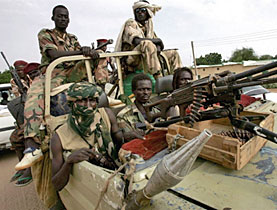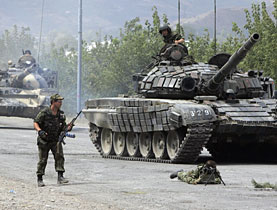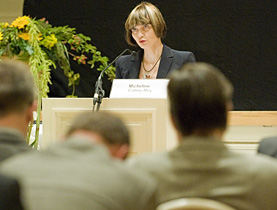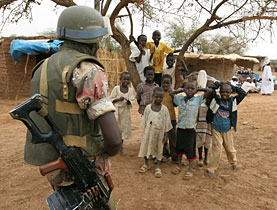Calmy-Rey highlights Swiss mediation in Darfur

Swiss Foreign Minister Micheline Calmy-Rey has praised Swiss mediation efforts in Africa, describing the work as discreet but very much sought after.
Speaking at a foreign ministry annual conference in Bern, Calmy-Rey cited Swiss experts who were involved in advising rebel groups in Darfur.
Despite the failure of the Abuja peace talks in 2006, Switzerland continues to be involved in the troubled Sudanese region, attempting an “innovative” solution, the foreign minister said.
Bern is involved in building the “skills” of the various rebel groups in areas such as human rights, humanitarian law, setting up state institutions and negotiating methods.
The Sudanese government accepts these efforts, Calmy-Rey said. Khartoum recognises that the rebels will be better negotiation partners if they are familiar with the limits imposed by humanitarian law, for example.
With the exception of the discussions held at Bürgenstock in 2002 on the cease-fire in the Nuba mountains region of Sudan, Switzerland does not lead mediation, she revealed at the opening of the security conference.
Swiss experts, “very much in demand”, also took part in discussions on Burundi, talks between the Ugandan government and the rebels of the Lord’s Resistance Army (LRA), as well as in the Abuja negotiations on Darfur, she said.
“Our African partners praise us for our engagement in Africa, as do our international partners,” Calmy-Rey said.
Criticism
Criticism is more likely to stem from Switzerland, particularly because of contact made with certain rebel groups accused of war crimes, such as the LRA.
Calmy-Rey defended such contacts, noting that those who want peace have to speak to the commanders of rebel movements as well. But she stressed that Switzerland had always maintained contact with the International Criminal Court (ICC) and was still opposed to an amnesty for groups accused of war crimes.
The Swiss intermediary, Julian Hottinger, met Joseph Kony, leader of the LRA, about six times between 2006 and 2008.
The meetings occurred despite the fact that the ICC had issued arrest warrants against Kony and three of his commanders in 2005 on suspicion of war crimes and genocide.
Hottinger’s mission, which he described as “very delicate”, was the first time Switzerland had dealt with anyone facing an ICC warrant.
“We are well accepted because we are neutral, we have no colonial past or hidden agenda,” Hottinger told swissinfo.
However, he also said that he sometimes had to apologise for Switzerland’s past actions in relation to Africa, such as supporting apartheid and providing banking and residence for dictators.
Controversy
Calmy-Rey sparked controversy in August after a foreign policy speech given to a conference of ambassadors in which she mentioned Osama bin Laden and dialogue in the same sentence.
Singling out those who took the moral high ground, she gave a list of those normally excluded from dialogue – parties involved in conflict and rogue states. She went on to pose a rhetorical question about whether countries should go so far as to sit down at the same table as al-Qaeda’s leader.
The Swiss foreign ministry was forced to issue a speedy clarification to the effect that Calmy-Rey had not said she would actually enter into dialogue with the militant Islamic group.
swissinfo with agencies
Just over five years since war broke out in Darfur, the situation remains grim. Peace talks have failed to get off the ground, only 9,000 of the 26,000-strong hybrid United Nations-African Union peacekeeping mission have been deployed and two-thirds of the region’s population are dependent on the world’s largest aid operation.
The conflict, which has claimed over 200,000 lives and displaced 2.5 million people in Sudan and 400,000 into Chad, has become more complex and seems to have entered a new phase.
In June UN organisations warned that conditions were poised to deteriorate rapidly in Darfur. UN humanitarian coordinator Mike McDonough described a “perfect storm” of threatening developments: growing violence, overcrowding in refugee camps and a bad harvest.
In February 2007 the ICC indicted two Sudanese officials for war crimes relating to Darfur. Yet Sudan says the ICC has no jurisdiction and refuses to hand over the suspects.

In compliance with the JTI standards
More: SWI swissinfo.ch certified by the Journalism Trust Initiative



You can find an overview of ongoing debates with our journalists here. Please join us!
If you want to start a conversation about a topic raised in this article or want to report factual errors, email us at english@swissinfo.ch.